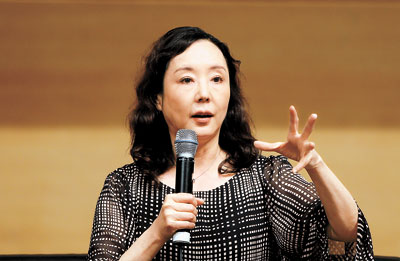
CHINESE-AMERICAN writer Yan Geling is an influential writer in the literary world, both at home and abroad, thanks to her insightful writings in both Chinese and English. Her fame was reinforced three years ago after her book “The Criminal Lu Yanshi” was published. The last 30 pages of the book were adapted into Zhang Yimou’s film “Coming Home” this year. Yan shared some of her writing stories last week at the Hong Kong Book Fair.
Born into a literary family in Shanghai in the 1950s, Yan’s interest in reading and writing was nurtured by her father. She had trouble reading works by Lu Xun, but she loved adventure stories and devoured “Don Juan” and “A Dream of Red Mansions.”
She said, when she was young, she read purely for pleasure and didn’t worry about the quality of the content too much. “I would read voraciously about interesting characters such as Baoyu and Daiyu [from ‘A Dream of Red Mansions’], but it was hard to pay attention if the characters were dull,” she said.
Yan’s thirst for reading developed further after she joined the military’s art troupe as a dancer at age 12. This was during the Cultural Revolution, and books started to become rare. She cherished dilapidated copies of foreign novels and biographies she occasionally found in army warehouses. She has clear memories of how she cautiously tucked the books away and removed their covers so people couldn’t find them or figure out what she was reading.
She said that the books she read during that period, especially “Byron” by Andre Maurois, had a lifelong effect on her. She developed an admiration for Byron’s perseverance, and she told herself after reading the book that “there’s nothing I can’t do if I have the will.”
After writing for more than three decades, Yan said she still enjoys it because she never seems to know what direction her stories will take. She still becomes overwhelmed with joy when she completes a book. “For 30 years, I have kept writing because I had the willpower,” she said. “While dancing trained my body to be strong, the book ‘Byron’ nurtured my spirit to be as strong as iron.”
Yan said reading is the path to becoming a good writer. “Reading taught me how a writer should draw from life experiences and refine those experiences on paper. My writing is indivisible from what I have read. My writing may bear the influences of other writers, but I eventually developed my own style,” she said.
Yan is still a fervent reader. In her eyes, books enable both readers and writers to be productive with their time by immersing themselves in reveries, cultivating their temperament and making self-improvements. “Reading is what everyone needs to connect with one’s inner self. Reading is a sanctuary from all the mundane worries in the real world,” she said.
Yan is very particular about how she approaches her writing. “I won’t start writing unless I have a clear image of the story already planned out in my brain. It’s also difficult for me to start a story if I don’t believe the protagonist’s role,” Yan said. “It is easier for people who read a lot to acquire maturity in choosing what to write and how to write than those who don’t.”
Yan doesn’t believe her books are suitable for being turned into screenplays even though 13 of her books have been.
Out of all of her books, she thinks that “The Criminal Lu Yanshi” was the most troublesome to write. “I was so emotionally exhausted,” she said. “I was certain I had produced garbage. I often cried to my husband at night that my inspiration had dried up.”
She later attributed that painful experience to her lack of self-confidence, a feeling that lingered even after she completed the book. She made repeated changes to the story, constantly pruning and supplementing the manuscript, before she handed it over to her editor.
As a prolific writer with a strong following, Yan said she is often urged by her editors and publishers to write even though she needs to stick to her own writing speed. “I have to constantly defend the freedom of my writing career and decide for myself what I write and when my books will be finished,” she said.
Yan also uses real experiences to try to inject more life into her stories. She flew to Japan three times while writing “My Aunt Duohe” and she went to Macao to learn how to gamble and to talk to casino workers before she wrote “Mage Is a Town.”
Yan published her first novel in 1985 and later wrote in Chinese and English thanks to influences from overseas Chinese communities. Most of her novels are concerned with people at the bottom of the social ladder and integrate reflections on human nature, philosophy and critical awareness while giving insightful and original interpretations of Western cultures. A few of her most popular works are “The Banquet Bug” (published as “The Uninvited” in Britain), “The Lost Daughter of Happiness” and “13 Flowers of Nanjing.” Her works have been translated into 20 languages, including English, French, Japanese, Thai, Dutch and Spanish.
She is a member of the Hollywood Writers Guild of America and the Writers Association of China and is an Oscar judge for the Best Screenplay category.
(Anna Zhao)
“For 30 years, I have kept writing because I had the willpower. While dancing trained my body to be strong, the book ‘Byron’ nurtured my spirit to be as strong as iron.”
— Yan Geling
|

